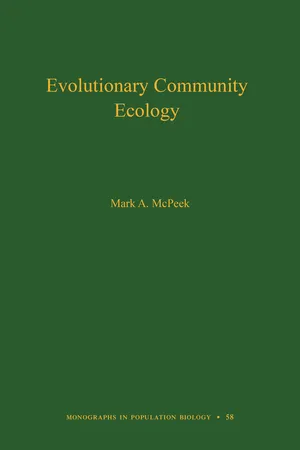
- 336 pages
- English
- PDF
- Available on iOS & Android
Evolutionary Community Ecology
About this book
Evolutionary Community Ecology develops a unified framework for understanding the structure of ecological communities and the dynamics of natural selection that shape the evolution of the species inhabiting them. All species engage in interactions with many other species, and these interactions regulate their abundance, define their trajectories of natural selection, and shape their movement decisions. Mark McPeek synthesizes the ecological and evolutionary dynamics generated by species interactions that structure local biological communities and regional metacommunities.
McPeek explores the ecological performance characteristics needed for invasibility and coexistence of species in complex networks of species interactions. This species interaction framework is then extended to examine the ecological dynamics of natural selection that drive coevolution of interacting species in these complex interaction networks. The models of natural selection resulting from species interactions are used to evaluate the ecological conditions that foster diversification at multiple trophic levels. Analyses show that diversification depends on the ecological context in which species interactions occur and the types of traits that define the mechanisms of those species interactions. Lastly, looking at the mechanisms of speciation that affect species richness and diversity at various spatial scales and the consequences of past climate change over the Quaternary period, McPeek considers how metacommunity structure is shaped at regional and biogeographic scales.
Integrating evolutionary theory into the study of community ecology, Evolutionary Community Ecology provides a new framework for predicting how communities are organized and how they may change over time.
Tools to learn more effectively

Saving Books

Keyword Search

Annotating Text

Listen to it instead
Information
Table of contents
- Cover
- Title
- Copyright
- Dedication
- Contents
- Acknowledgments
- 1. Ecological Opportunities, Communities, and Evolution
- 2. The Community of Ecological Opportunities
- 3. Evolving in the Community
- 4. New Species for the Community
- 5. Differentiating in the Community
- 6. Moving among Communities
- 7. Which Ways Forward?
- Literature Cited
- Index
Frequently asked questions
- Essential is ideal for learners and professionals who enjoy exploring a wide range of subjects. Access the Essential Library with 800,000+ trusted titles and best-sellers across business, personal growth, and the humanities. Includes unlimited reading time and Standard Read Aloud voice.
- Complete: Perfect for advanced learners and researchers needing full, unrestricted access. Unlock 1.4M+ books across hundreds of subjects, including academic and specialized titles. The Complete Plan also includes advanced features like Premium Read Aloud and Research Assistant.
Please note we cannot support devices running on iOS 13 and Android 7 or earlier. Learn more about using the app